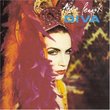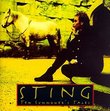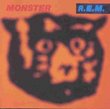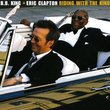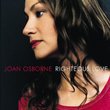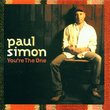| All Artists: Chicago Title: Chicago VII Members Wishing: 6 Total Copies: 0 Label: Rhino / Wea Original Release Date: 1/1/1975 Re-Release Date: 11/5/2002 Album Type: Original recording reissued, Original recording remastered Genres: Pop, Rock, Classic Rock Style: Album-Oriented Rock (AOR) Number of Discs: 1 SwapaCD Credits: 1 UPCs: 081227617721, 081227617769 |
Search - Chicago :: Chicago VII
 | Chicago Chicago VII Genres: Pop, Rock, Classic Rock
Expanded and Remastered, features the original double-album's 15 jazzy pop tracks, including the hits '(I've Been) Searchin' So Long,' 'Wishing You Were Here' and 'Call On Me.' Also includes the bonus track 'Byblos' (r... more » |
CD DetailsSynopsis
Album Description Expanded and Remastered, features the original double-album's 15 jazzy pop tracks, including the hits '(I've Been) Searchin' So Long,' 'Wishing You Were Here' and 'Call On Me.' Also includes the bonus track 'Byblos' (rehearsal version). Rhino. 2002. Similarly Requested CDs
|
CD ReviewsChicago Refreshed & Renewed Lonnie E. Holder | Columbus, Indiana, United States | 02/25/2005 (5 out of 5 stars) "After the relatively downbeat pop of "Chicago VI," this album shows an energetic Chicago with a positive musical outlook. While the pop element is retained, there are also incredible jazz moments that can take you back to the first three Chicago albums. The first five tracks are instrumentals, yielding more than 25 minutes of wonderful music that alternates between jazz, progressive jazz, jazz-rock, and other combinations that are easy to lose in the complexity of the music. The instruments include congas, horns, keyboards, including a mellotron, Fender Rhodes, ARP synthesizer, and clavinet, a flute, drums and guitars. "Prelude to Aire" provides an initial indication of the flavor of the instrumentals with a strongly African influenced beat. If you liked Paul Simon's "Graceland," you should also like "Prelude to Aire." "Aire" is a jazz instrumental with but a flavor of the introductory song. Peter Cetera and Terry Kath both get to strut their stuff in the second half of the song, with Terry Kath turning funky for a portion of his lead. "Aire" is complex and relatively long at almost six and a half minutes, but the following instrumental, "Devil's Sweet," is even longer. Portions of this ten minute composition are introspective, allowing jazz noodling of a core musical theme. Certain portions remind me of some of King Crimson's more experimental 70s work. The mixture of 50s retro style with Jazz and rock creates an interesting instrumental composition that requires multiple listens for full appreciation. "Italian from New York" fits well with the previous instrumentals. This instrumental begins with sound effects that are retro, yet modern. The sound effects are married to horns and later a funky guitar to create a fusion that is new and old, interesting and unique. The last instrumental composition, "Hanky Panky," sets up the transition from the instrumental mini-suite to the first song of the album. "Hanky Panky" is a celebration of music and jazz and declares its enthusiasm for the music that came before and the music that comes after. The first song keeps a jazz theme for continuity with the opening instrumentals. The vocals have a Beatle's style when they open, and "Life Saver's" peppy beat sets the optimistic tone for the music of this CD. "Happy Man" is a mellow pop love song from Peter Cetera. The pace is slower than the earlier songs, and yet the song is a celebration, with upbeat percussion and vocals. The next song was the first hit from this album. An edited version of "(I've Been) Searchin' So Long" was backed by "Byblos" in release. The single reached #9 on the Hot 100 and #8 on the Easy Listening charts. As was typical of Chicago's music at that time, the music was very carefully arranged and heavily orchestrated. This pop song is flavored by horns rather than being a true jazz fusion. This song also features strings to further expand the complexity of the music. The vocals are arranged with similar complexity and make this song one of Chicago's all-time greats. I have no idea what "Mongonucleosis" is about. The lyrics are "Que pe chesa" repeated. The music is Hispanic-styled and fast. This music is easy on the ear and fun, maintaining the optimistic tone of the album. "Song of the Evergreens" is Terry Kath poetry. The lyrics are evocative and the complex music is rock. The repeated "snow" lyrics at the end of the song could be annoying, and yet they are not. Once again the music is catchy and tempts you to hum along. Near the end of the song the guitars break down into a funky sound characteristic of the mid-70s. "Byblos" is a lyrically complex song. This song is a story song in the tradition of those sung by Harry Chapin and Gordon Lightfoot. We never learn her name, but we know she affects those around her with her presence, an inner beauty that makes you long for her presence once more, while feeling comfortable just because she is in the world. This song is yet another Terry Kath poem set to mellow and pretty music. The next song has always been one of my all-time Chicago favorites. "Wishing You Were Here" was ethereal and haunting well before that type of song was popular in rock. Chicago's vocals are enhanced by the presence of the Dennis and Carl Wilson of the Beach Boys and Al Jardine. There is also an interesting synthesizer contribution to this song that helps provide an eerie aspect to the song's ethereal air. This song is one that must be heard to be appreciated. This song reached #11 on the Hot 100 chart and #1 on the Easy Listening chart, backed by "Life Saver." The next song charted #6 on the Hot 100 chart and also went to #1 on the easy listening chart. "Call on Me," backed by "Prelude to Aire," is a jazz-influenced pop love song. The lyrics are simple with yet more catchy pop hooks. The song speeds up at the end to rush through the last 30 seconds, leading into "Women Don't Want to Love Me." This song has a funky blues rhythm and is a breakup song. Similarly, "Skinny Boy" also has a funky blues style. Both songs are by Robert Lamm. This version of the CD includes a rehearsal of "Byblos," which pushes the total time for this CD to about 78 minutes, indicative of the original double vinyl album. This rehearsal is shorter than the released version, and contains some variation from the original. From "Chicago Transit Authority" Chicago just seemed to get better and better. This CD shows pop influence, but there are just as many other influences, including jazz, blues and even Hispanic. This music is more than just great pop or rock; it is great music, period. If you are going to own music by Chicago, this CD is a must. " The Last Great Chicago Album A. Wolverton | Crofton, MD United States | 12/23/2003 (5 out of 5 stars) "I'm probably not alone is saying that the music of Chicago was my first exposure to jazz of any kind. At the time, I didn't know there were jazz elements in the band's music. I just knew that what I was hearing sounded different from all the other stuff I was listening to. And that it was very, very cool.After buying this CD today and listening to it for the first time in probably 20 years, I was delighted to find it still fresh, alive, and exciting. And it's still cool. The album opens with "Prelude to Aire," an outstanding combination of Walter Parazaider's wonderful flute playing mixed with some mesmerizing percussion from Danny Seraphine and (then) new member Laudir DeOliveira. The jazz-influenced instrumentals that follow, "Aire" and "Devil's Suite," are so compelling that you don't care that the boys aren't singing. In fact it's not until the sixth song that you hear vocals at all, but when you do, Robert Lamm's voice delivers with a satisfying impact. The amazing thing about this release is that Chicago was already a well-established group that didn't need to do any experimentation with their music. This is less rock n roll than any of their previous releases and carries very progressive musical ideas. Three singles are included, which today still sound fresh and vibrant: "Wishing You Were Here," "Call On Me," and "I've Been Searchin' So Long." Pop, funk, Latin, and jazz are all represented on the disc and they're all done well. How many groups can do that today? How many would even ATTEMPT to diversify their sound? What a creative project! Give it a listen. You won't be sorry." Great re-issue of a great album.... Brian Christie | Montreal, Canada | 11/07/2002 (5 out of 5 stars) "CHICAGO VII was originally released in March 1974, quickly hitting # 1 and eventually spawning three big hit singles. Initially it was planned as a jazz record (hence the first 5 instrumental - and highly enjoyable - tracks) but with commercial concerns, they soon included a fresh selection of conventional pop tunes. Of the hits, you'll find "I've Been Searchin' So Long", "Call On Me" and "Wishing You Were Here" (with three of The Beach Boys), however many of the highlights are the non-hits, such as "Happy Man" (which has lost its false start on the original album - the only negative thing about the re-issue), the jazz workouts "Aire" and "Devil's Sweet", "Song Of The Evergreens", "Byblos" (one of Terry Kath's finest moments) and Robert Lamm's "Skinny Boy" (with The Pointer Sisters on backups). This was Chicago's last studio double album and their last truly experimental album - recorded at a time when they could do no wrong. The ballads were starting to seep through more but thankfully, Chicago still were in a creatively ambitious mood. It is not a surprise that CHICAGO VII is a personal favorite of many fans. It's one of mine. The Rhino re-issue itself is another great one and has faithfully restored the original artwork. I just wish that "Happy Man" had been left in its original state, but that is a minor quibble in the face of a fine re-release. One of 1974's most satisfying albums."
|

 Track Listings (16) - Disc #1
Track Listings (16) - Disc #1


